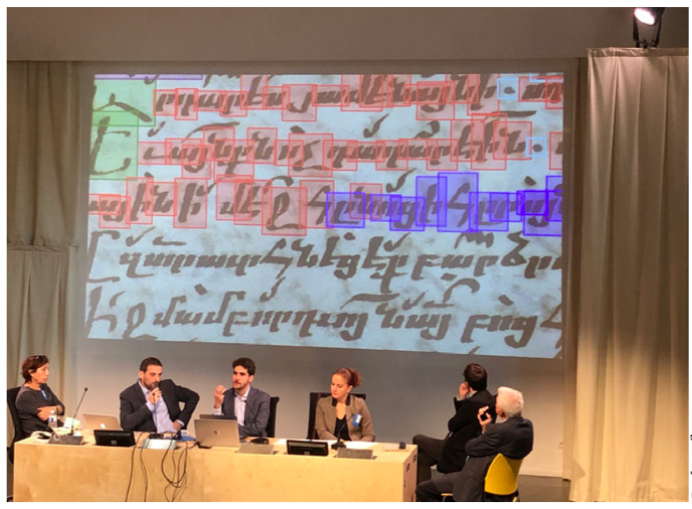
The USC Institute of Armenian Studies co-sponsored two international conferences in October. The first was entitled “Digital Armenian” and took place in Paris from October 3 to 5. The other was entitled “Diaspora and ‘Stateless Power’: Social Discipline and Identity Formation Across the Armenian Diaspora During the Long Twentieth Century” that took place at the University of California, Los Angeles (UCLA) from October 12 to 13.
“Digital Armenian” brought together various international actors who develop and implement innovative digital solutions for the examination, promotion, and teaching of the Armenian language. The conference showcased the latest technologies developed for Armenian in all three standards – Classical, Eastern, and Western – and the trajectories of ongoing projects in the digital domain.
The topics addressed included online dictionaries for Western, Eastern and Classical Armenian; databases for self-study of Armenian; digitization projects for the Armenian cultural heritage and digital libraries projects; e-learning platforms for the Armenian language and history.
“In its existence as a minority language, often in competition with globally and digitally powerful languages, the democratization and accessibility of knowledge and tools provided by digital solutions help boost the linguistic capital and prestige of Armenian,” commented Institute deputy director Dr. Karapetian, who presented at the conference. “In other words, the relevance of the digital domain for the cultivation and promotion of Armenian cannot be underestimated.”
Dr. Karapetian was in a panel on new technologies on automatic language processing, with her talk, “Digital Solutions and Challenges for Armenian as a Heritage Language.” Her presentation examined the issue of heritage language vitality in a diasporic context, with a special focus on leveraging digital tools for the acquisition, teaching, and promotion of Armenian as a pluricentric language.
In terms of Natural Language Processing classifications, Armenian does not have a widely recognized presence. “In this context, the conference was a good opportunity to meet teams that are working on its preservation and its transmission, and to realize state-of-the-art related technologies and databases for studying the possibilities of collaboration,” stated Chahan Vidal-Gorène, the leading organizer of the conference.
The “Diaspora and ‘Stateless Power’: Social Discipline and Identity Formation across the Armenian Diaspora during the Long Twentieth Century” conference at UCLA marked the 45th anniversary of the founding of the Society for Armenian Studies and honored renowned diaspora scholar Khachig Tölölyan.
Tölölyan is one of the founders of the field of diaspora studies and the founding editor of the distinguished journal Diaspora: A Journal of Transnational Studies.
“This conference serves as a unique platform to examine and celebrate the liminality of the diasporic experience, highlighting the seminal contribution of Khachig Tölölyan’s work on transnational studies,” stated Institute director, Salpi Ghazarian.
Two members of the Institute staff presented their research at the conference. Gegham Mughnetsyan, Chitjian Researcher Archivist at the Institute, presented research on “Armenian Displaced Persons: From Funkerkaserne to Montebello,” which provided on overview of one of the Institute’s oral history initiatives, looking at the experiences of the Soviet-Armenian refugees and their journey from German camps to America.
Lilit Keshishyan, a research associate at the Institute and an instructor in USC’s Writing Program, presented research on “Defiant Adherence: Cultural Critiques in Late Twentieth Century Armenian Diasporic Literature.” Dr. Keshishyan’s presentation focused on novels by Hakob Karapents, Vahé Oshagan, and Vahe Berberian, arguing that the obligation to a national cause informs both the content and form of the texts, which pit tradition against change.
In addition to the Institute, the conference was co-sponsored by The Armenian Studies Program at California State University, Fresno; the Calouste Gulbenkian Foundation; The Narekatsi Chair in Armenian Studies at UCLA; the Richard Hovannisian Endowed Chair in Modern Armenian History at UCLA; and the Meghrouni Family Presidential Chair at UC Irvine.
Scholars from around the world explored themes from Armenian immigrants in the transnational context and social memory and cultural production in the Armenian Diaspora, to Armenian communities in the Middle East and (Soviet) Armenian-Diasporic relations.









